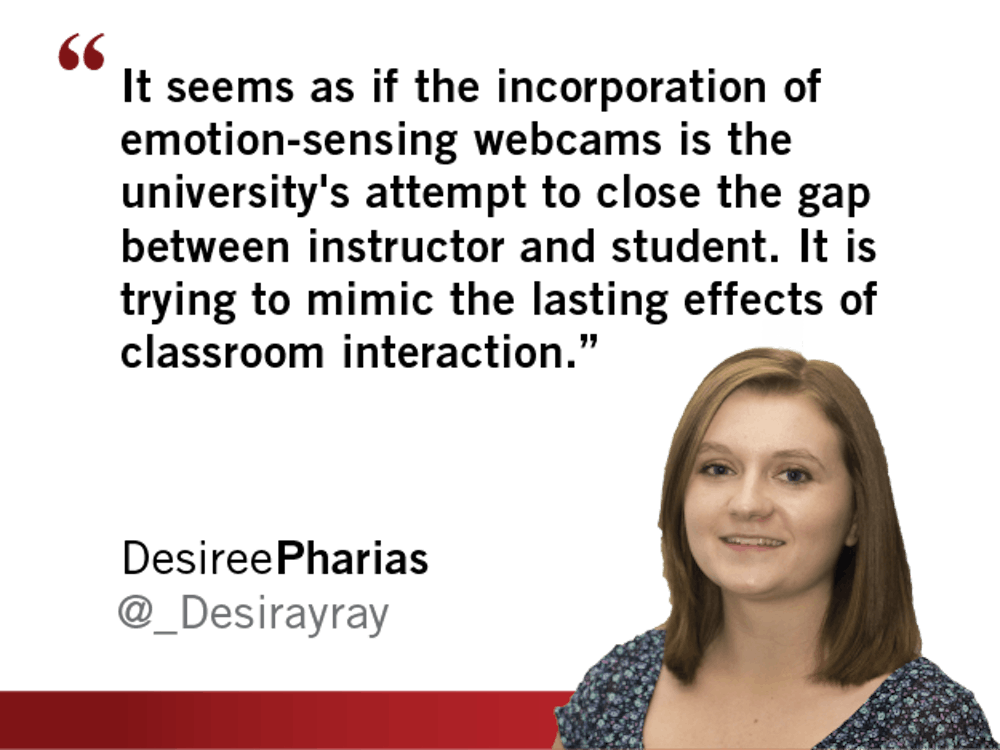With technology taking over the world and winning our hearts, it seems as if there is very little we can do without our gadgets. Online classes are offered by universities across the nation as an alternative to physically attending the campus. Although this is an optimal option for many, the new technological advances within online courses are worrisome.
 A program has been created for online classes that consists of a webcam with the ability to analyze students' facial expression to see how they are feeling about the assignment. The feature has the ability to sense “eyes opening wide in expectation or squinting in close attention, eyebrows knitting in concentration or rising in surprise,” Annie Murphy Paul said in her article on Slate.com.
A program has been created for online classes that consists of a webcam with the ability to analyze students' facial expression to see how they are feeling about the assignment. The feature has the ability to sense “eyes opening wide in expectation or squinting in close attention, eyebrows knitting in concentration or rising in surprise,” Annie Murphy Paul said in her article on Slate.com.
Not only that, but researchers at the University of Massachusetts Amherst built a program which “features an onscreen avatar that subtly mirrors the emotions the learner is feeling. When the learner smiles, the avatar smiles too, making the learner feel understood and supported,” Paul said.
In reality, this form of learning seems extremely invasive. An avatar reflecting the learners' emotions may in fact just make them feel uneasy, uncomfortable and under constant watch. The article also mentions that the avatar echoes words of encouragement as it analyzes your expressions to peg how you’re feeling throughout the assignment, hopefully they have an avatar that can reflect the awkwardness these students will inevitably feel.
The advances in technology for online courses are based upon a study that proved that a students emotions are closely related to how well they are doing in the class. The one-on-one interaction between student and teacher aids the student simply because the “important reason why tutoring is so effective (is) the management of emotion,” Paul said.
It seems as if the incorporation of emotion-sensing webcams is the university's attempt to close the gap between instructor and student. It is trying to mimic the lasting effects of classroom interaction. Unfortunately, computers are creating a substantial gap between the two, one that can’t be closed by extremely invasive technology.
Other advances have been invented besides the invasive webcam and mimicking avatar. Paul said “Pressure Mouse” has been invented by our own ASU, in order to “detect how much pressure a user applies when clicking." If you had too much coffee that day, you’re surely screwed. Your mouse is going to think you don’t understand if you press down on the mouse more than normal.
She also said a “Posture Analysis Seat” has also been invented “to monitor the way learners are arranging their bodies." Let’s hope the chair doesn't beep when you lean back in boredom.
Although it is important for the instructor to know how his or her pupil is feeling in relation to the lesson at hand, these technological advancements are not the way to do it. We can’t shove a webcam in someone's face and give him a special mouse and think it makes up for the absence of a face to face classroom. Not only that, but not all university professors analyze their students in this way even when present in class. These advancements will make some students feel violated and put too much pressure on them as they tackle each task at hand. If the student opts to take a class online, we can assume that he is mature enough to deal with his emotions toward the course accordingly, without the supposed assurance of a matching confused avatar.
Reach the columnist at dpharias@asu.edu or follow her on Twitter @_Desirayray
Editor’s note: The opinions presented in this column are the author’s and do not imply any endorsement from The State Press or its editors.
Want to join the conversation? Send an email to opiniondesk.statepress@gmail.com. Keep letters under 300 words and be sure to include your university affiliation. Anonymity will not be granted.
Like The State Press on Facebook and follow @statepress on Twitter.




